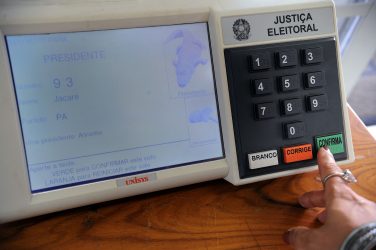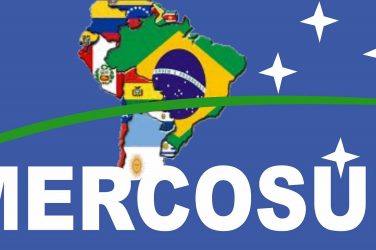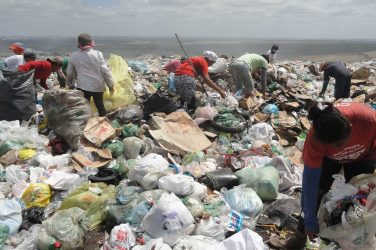Over the past two months, opposition parties and civil society movements in Brazil have organized two nationwide demonstrations. The assembly that occurred on Saturday October 2 achieved a feat unseen since civil society groups dared to face down the murderous military dictatorship in the 1980s.
Under a common banner against Bolsonaro, the most recent protest united ex-president Fernando Henrique Cardoso’s conservative Social-Democratic Party (PSDB), the PT Workers’ Party headed by newly acquitted ex-president Lula da Silva, the growing collectivist and socialist PSOL, as well as smaller but significant acronyms like the REDE, PSB and even the dubious PTB.
As Brazilian society sinks ever deeper into poverty, standard complaints about the high cost of living have morphed into political contestation. Not even Bolsonaro’s coup-baiting Independence Day rallies could quell the mounting tide of opposition to his government’s responsibility for over 600,000 Covid-19 related deaths and thrashing of the economy. On October 2, there were demonstrations in more than 200 cities throughout the country.
The question to be asked now is whether this public outcry can have a real impact on the power structure that has taken hold of the State apparatus since the 2016 Coup against President Dilma Rousseff. Were speculation based merely on numbers, one could say it ought to. And with growing evidence of wrongdoings building against the president and his family members, it surely should. Still, the momentum bringing so many out into the streets is not political discord as such. In point of fact, Bolsonaro and his family members are being accused of a series of very serious crimes.
The president, his circle and his family members are all cited in one or several of the following investigations. They are alleged to have knowingly participated in marketing negationist views on the pandemic and deliberately exposing the public to false information about Covid-19 and the means to combat it. The president and one or several of his family members are also accused of being stakeholders in at least one of the private health insurance companies whose medical affiliates promoted and prescribed the so-called Kit-Covid prevention drugs.
Their efficiency was disproven by the World Heath Organization soon after the pandemic began and later confirmed by various independently run studies. In addition, the president and one or several of his family members are alleged to be stakeholders in various firms responsible for distributing the vaccines nationally.
Conflict of interest in these cases now adds on to the mounting investigation into illegal use of undeclared funds to bombard the electorate with fake news ever since Bolsonaro began his run for office – provided of course it was not State money in the first place, namely military money.
Whether these allegations actually turn into prosecution or not, one fact is undeniable. The president, a notorious negationist to this day, simply undermined vaccine purchases for his fellow Brazilians. While boasting himself as an anti-vax success story, he deliberately appears in public without wearing a mask, drawing huge crowds and hugging everyone from the elderly to infants. His government is accused still of deliberately seeking herd immunity at whatever cost in deaths.
Investigations into these allegations are being conducted publicly in a special commission tied to the Senate and behind closed doors by the Supreme Court. If answering to the recent past bothers the president enough, he and one or several of his family members are also accused of retaining salaries from fictitious staff while previously in office at different levels of public government.
Last August, the Articulation of Indigenous Peoples of Brazil denounced his government before the International Criminal Court for genocide. Then last week, his finance minister, Paulo Guedes, was cited as holding offshore assets in the Pandora Papers – along with a host of Bolsonaro’s corporate sponsors, the tropical version of modern primitive accumulators par excellence.
Meanwhile, new doubts have emerged regarding the truth of the Juiz de Fora assassination attempt against then candidate Bolsonaro. A recent documentary directed by investigative journalist Joaquim de Carvalho provides new evidence casting doubt on the official version of the story. As a result of the stabbing, Bolsonaro was able to sit out the presidential debates, though he accepted interviews from media allies. His standing in the polls subsequently skyrocketed.
So how does Bolsonaro hang on to power? Corporate media has certainly lent a gracious hand. In their view, Bolsonaro is as good for advertisement as he is for agribusiness and asset management. One of the clear signs the demonstrations are not seen as a risk for those in office, at least not an immediate one, has been the lack of police-incited violence against activists. Demonstrating in Brazil is never a risk-free option, especially for the Left.
Despite the lack of violence, Congress has deemed appropriate to rush through an anti-terrorist bill drafted in the wake of the 2013 Brazilian “spring” by the current president when still a congressman. If the Right has learned anything since then, it is how to channel the political objectives of demonstrations. Bolsonaro’s victory is proof perfect.
Shielded by silence lie the generals. Making up a politically motivated group some analysts have called a “military party”, there are seventeen generals in what is equivalent to the U.S. Joint Chiefs of Staff, though they answer to no civilian authority. At best, they seem determined to avoid drawing any unnecessary attention to their bid to preserve up to 10,000 commissioned positions in the State apparatus seized under Bolsonaro’s rule and to keep extracting very favourable perquisites from the State Budget.
In the build-up to the 2022 presidential elections, Bolsonaro is still seen as the far right and center-right’s main contender, but he does tread fragile legal ground. He remains a contender not because the country has become “Bolsonarist” per se. Dominant sectors need not have waited for him to show their white supremacy. Why Bolsonaro remains a strong contender is because the generals have managed to destroy the political Right.
As weak as he is, there is no doubt the military has emerged stronger in this process to jettison the country, its culture and its scientific knowledge than any other political entity – save for Lula da Silva. Due in large part to his brilliant team of lawyers, Lula slipped through the lawfare set up to clear the path for the generals, but barely.
Radical politics can never underestimate the paralyzing force of contradictory information. Were one to study military strategy regarding social unrest – as one must these days in Brazil – it surely makes sense to put off an eventual clampdown at least until the outcome of the next elections. Polls unequivocally suggest that, were the elections held today, Lula da Silva would win by a landslide. As the country’s leading statesperson, even he has steered away from commenting on, let alone criticizing, the generals. Lula does like to recall, though, how generous his governments were to boosting the salaries of non-commissioned officers.
As the economic scenario keeps crumbling, the stranglehold the military has kept on the minds of soldiers might begin to loosen. And the public trust that was a hallmark of the military prior to 2018 has started to decay. A growing number of Brazilians identity the top-ranked officers as part of the very oligarchy increasingly being pointed to as the cause of abysmal inequality. A traditional oligarchy profiteering from deforestation and the on-going depredation of Indigenous lands.
In other words, the generals run the Bolsonaro government after having created the Bolsonaro presidency itself. Generals may hold powerful seats in cabinet and head the most powerful State corporations, like Petrobras, Eletrobras and the Bank of Brazil, but they have most devastatingly infiltrated civilian positions. And when they speak to the press, they manage to do so in name of the opposition. In fact, in all of their public statements, one hears an unwavering loyalty to American interests, both military and religious.
Bolsonaro’s inner circle has also dug a wall of defense in the Chamber of Deputies. Its current president, Arthur Lira, sits upon a mound of a hundred and thirty impeachment petitions against his boss. Instead of due process, Lira has torpedoed through a series of bills aimed at the privatization of anything making money for the State.
As for the Attorney General, he has shown himself to act in name of the president’s stability in power and against any allegations regarding his family. The Justices of the Supreme Court, marked by ego-inflated self-interest, have nonetheless had to repel repeated threats made to shut the Court down altogether. The rule of law has come under regular attack by Bolsonaro’s shock troupes, which includes infiltration by fanatics acting as trainees into the cabinets of Justices critical of the government.
Meanwhile an army of white supremacist journalists and experts employed by CNN-Brasil, paid off directly by the executive or working out of their own religiously motivated zeal, strive to keep any damaging evidence from reaching the public. They drum the sounds of fascism generated from within the government’s communications secretary toward a population made increasingly desperate by double-digit inflation, spiralling gasoline prices and the astronomical cost of food.
Recent figures on employment point to 80 percent of jobs in the country being “informal”, that is, self-employed to some degree, which includes the uberization of the workforce. Another clear sign of the tremendous transfer of wealth underway emerges from data on credit and debt. Defaulting is a severe risk made more vivid still by shocking scenes of families doomed to eat de-meated bones.
As nothing is left to extract from the extremely poor, such scenes project the literal picture of what the neo-feudalist policy driving the dominant sector has done to people’s lives. The country’s banking industry is concentrated into four private and two State-owned banks.
Since the Coup, the two public banks have predictably seen a sharp drop in profits as their Bolsonarist CEOs get ready to privatize them. Meanwhile, three of the four private banks have maintained astronomical rates of 20 percent profits per year despite how 2015 amounts, at least according to textbooks, to a depression.
In a recent interview with hip-hop icon, Mano Brown, Lula da Silva recalled how in 2002 as president-elect his salary was frozen at that of a tenure-track university professor whereas house representatives, senators and the judiciary had voted for generous increases for themselves. Should Lula be elected again in 2022, he will face more than a low salary.
The dominant class has prepared a double-barrelled obstacle to renewing any public funding as economic policy has increasingly been constitutionalized. Henceforth, two thirds of the lower House vote will be required to introduce social-democratic measures and public investment, the very means by which to lift the public from the recent return of extreme poverty.
In Brazil, electoral colleges do not determine who becomes president. The public’s direct vote does. Demonstrations, larger and more diverse, will then become vital if only to ensure election security.
Norman Madarasz is a researcher in political philosophy and literature currently located in Brazil. His most recent academic publications have dealt with critical race theory and the philosophical critique of economic theories. He can be reached at: normanmadarasz@yahoo.ca.













